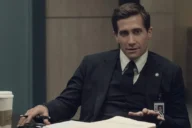As TV breaks bad, defying the conventions of how we watch and letting us mainline what we want, when we want it, Emily Cleaver argues that binge watching is not only the future of TV, but also its saviour.
I recently watched two series of AMC’s Breaking Bad in a month, gunning through several episodes a night in order to be up to speed by the time the much-anticipated final episode aired on September 29th.
My partner and I emerged, traumatized and emotional, from entire evenings in the company of Walt, Jessie and the rest. We’d talk about it, post about it, even dream about it occasionally after particularly harrowing episodes.
Actually, what we’d often talk about with friends was not the plot, magnificent though it was, but the shared experience of binge viewing itself. We were all at it.
Binge viewing is going mainstream. ‘Binge-watch’ made the shortlist for Oxford Dictionary’s Word of the Year in 2013. 50,000 Americans watched all 13 hours of the penultimate season of Breaking Bad on the day before the fifth season premiered. Streaming site Netflix, the provider mostly responsible for making such behaviour possible with its on-demand content, recently announced that binge viewing was “the new normal”, releasing research showing that, of its users who regularly stream content, 61% binge-watch two or more episodes of shows at the same time, 73% of them say they feel good about it, and 79% say it makes them enjoy the shows more.
But critics and cultural commentators have responded to the Netflix figures, and to the binge-watching trend in general, with a slightly sneering tone. From labelling the Netflix model of releasing entire series at once as a commercial mistake, to more extreme claims that binge watching “ruins” what makes TV shows great, compromising its episodic structure and thus the “integrity of the art form.”
Binge viewing is presented as a guilty pleasure, done alone because we’re ashamed to reveal to our loved ones just how many episodes of Game of Thrones we gorged our way through in one sitting. It’s seen as over-indulgence, the behaviour of the weak-minded, who can’t be trusted to resist the addictive wiles of the TV.
But this is all too much reactionary nonsense. Breaking Bad was the best TV experience of my life, a long-term, intense participation shared with my partner and friends, and one that owed much of its intensity to the way we watched it. Binge viewing isn’t the preserve of sad loners – we’re not talking about sobbing your way through the entire Sex and the City back catalogue post break-up, alone in your pyjamas with a supersized tub of chocolate ice cream here. It’s a social event, with families and friends making an occasion of it. Over half of us, according to Netflix, like to binge-watch with others.
And watching several episodes in a row doesn’t destroy the episode structure of TV, any more than watching a Shakespeare play without getting up to go to the bar in the interval ruins the five-act structure.
Of course, Netflix has a vested interest in promoting binge watching as the “new normal” – its entire business model is based around the concept. But for those of us normals who enjoy the experience, who get something positive from it, the stigma is getting tiresome.
Because the truth is, this isn’t an irresponsible over-indulgence; it’s just what happens when we have control over our own TV consumption. This is the way TV is meant to be; it just hasn’t been able to technically deliver it before.
But even more than that, binge viewing has the power to change and revitalize TV. It’s already changing the shape of it – services like Netflix and Amazon are creating their own high-quality content and releasing it all at once (or a few episodes at a time, in the case of the more cautious Amazon). It’s changing the way TV shows are made, for the better. Kevin Spacey, star of the exclusive Netflix series House of Cards, has said that the Netflix model allowed them to make the series the way they wanted. Rather than make a pilot, as the traditional networks were demanding, constraining them to the equivalent of a sales pitch as a first episode, Netflix allowed them to “start to tell a story that would take a long time to tell” from the beginning. And how we experience that story is left entirely up to us.
According to its creator Vince Gilligan, Breaking Bad, now widely feted as the greatest TV show of all time, was saved by binge viewers. He told Wired that “… it’s very possible we wouldn’t have made it to 62 episodes without this creation of these technologies and this cultural creation of binge-watching.” As the buzz grew, new viewers were able to catch up with past series and join in for the big finale.
Gilligan used the phrase “critical mass” to describe the snowball effect that got Breaking Bad through to the final commissioning round. And perhaps that phrase holds the secret to what’s really going on here. It’s the ‘mass’ element that the critics have a problem with – the masses watching masses of episodes at once. This is snobbery about mass culture, an ingrained prejudice towards TV, which is seen as substandard, a controlled substance not to be left in the hands of an undiscerning public.
There’s no censure attached to watching, say, a 3-hour Tarkovsky cinematic epic. If you watched two in a row, it would be admiringly referred to as a ‘marathon’, with connotations of sporting achievement and dedication. But invest the equivalent time in three episodes of a TV drama in a row, even one as critically acclaimed as Breaking Bad, and what you’re doing is labelled as an addiction, an excessive indulgence, and the content is relegated to the status of a drug, or junk food.
But the truth is that television now has the power to deliver more than film has been able to do in the past in audience engagement, impact and artistic merit. This is immersion like cinema never imagined – the ability to tell more complex stories with larger casts and fully developed supporting characters, allowing viewers to follow a story arc in any way they choose, over many weeks or an intense few days.
The bottom line is, we love stories. And the power to experience them how we want to is a liberating thing, both for us, and for the networks that sell them to us.



















1 Comment
[…] This article originally appeared on The Book, The Film, The Tshirt. […]